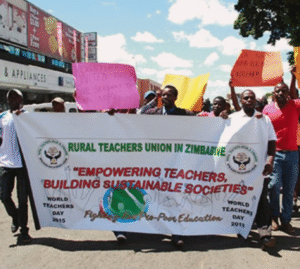ZIMBABWE’S URBAN CRISIS: THE RESULT OF NEGLECT AND EXPLOITATION
Amid the run-up to Zimbabwe’s August elections, the ZANU PF-led government persistently lambasts the opposition for their alleged mismanagement of urban regions, casting an illusion of being the bearers of solutions. The ruling party’s constant vilification of the MDC Alliance and CCC is intended to mask the state of decay in our towns and cities.
The plight of urban dwellers, particularly in smaller towns such as Redcliff, is demonstrated through a prolonged lack of reliable water services, coupled with dangerously deteriorated roads and persistent neglect of city infrastructure such as street lighting. Many question the intentions of the local authorities who seem to turn a blind eye to these glaring issues.

Moreover, a growing resentment brews amongst the residents who witness questionable dealings concerning land sales, with no apparent benefits trickling down to them. This sentiment intensifies when the proceeds of such suspect transactions are seemingly used to furnish the luxury lifestyles of the senior management, as evidenced by their ownership of high-end vehicles and smartphones.
The tender offer for the construction of a new major road in town further fuels the flame of suspicion. Despite substantial advance payments made, no significant work has been carried out for years. Additionally, residents are fed a continual stream of excuses for the dire state of water supply, primarily in Redcliff’s lower-density areas.
While these grievances are valid, it is unacceptable that the ZANU PF party attempts to exploit this chaos for political mileage. It’s an ironic scenario with President Emmerson Dambudzo Mnangagwa’s administration condemning the opposition while overlooking its own culpability in leading the country to its current state of despair.
Zimbabwe’s urban crisis, specifically the water woes, is a consequence of the ZANU PF government’s failure to invest in vital infrastructure and development. The government’s lack of foresight and neglect is evident in its failure to construct water bodies or upgrade inherited colonial infrastructure, causing widespread inconvenience due to a growing urban population.
Similar neglect is observed in Zimbabwe’s power generation sector. The country is forced to rely on outdated equipment installed either during the colonial period or just after independence. This lack of maintenance and upgrade has resulted in extended power outages, thereby inflicting further damage to an already fragile economy.
ZANU PF’s claims of handing over well-functioning cities to the opposition, post their electoral defeat to a nascent MDC, are distorted. The truth reveals a nation surviving on the remnants of colonial development, with the inevitable impact of decades of neglect finally taking its toll.
Interestingly, ZANU PF’s strategy of drilling boreholes in urban centres, as showcased by finance minister Mthuli Ncube in Cowdary Park, Bulawayo, and President Mnangagwa in Chitungwiza and Epworth, only highlights their inability to provide sustainable solutions to the urban water crisis.
By resorting to temporary fixes like boreholes, the Mnangagwa administration tacitly concedes its failure to uphold urban living standards. This approach raises doubts about their commitment to restoring fully functional water supply systems, let alone preventing the urban landscape from devolving into rural conditions.
The reliance on boreholes, even by those who control the country’s finances, is a grim reminder that irrespective of who leads the local authorities, the issue of potable water remains unsolved. This predicament points to a deep-rooted issue beyond opposition-led governance’s shortcomings.
In essence, the crux of the urban crisis lies in ZANU PF’s historic failures to develop and maintain water and electricity infrastructure. Any solution to this issue requires massive investment, which seems unlikely given the ruling party’s tendency to prioritise personal enrichment over national welfare.




